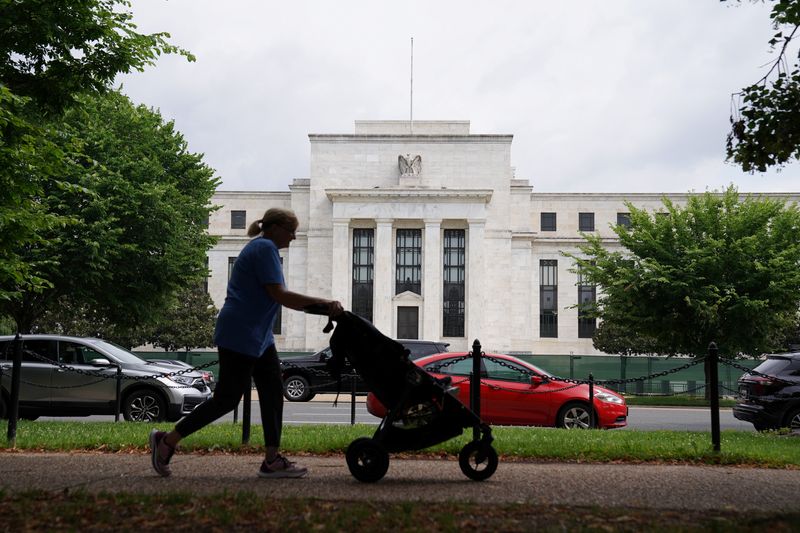Take Five: Cancel Summer?
2024.07.12 03:56
LONDON (Reuters) – Pressure on Joe Biden to step out of the U.S. presidential election race, mounting expectations of a September Fed rate cut, Q2 earnings, an ECB meeting and Britain’s king unveiling the legislative programme of the new Labour Government.
Don’t race off for that summer break just yet.
Here’s what to expect in the week ahead for world markets from Ira Iosebashvili in New York, Yoruk Bahceli in Amsterdam, Li Gu in Shanghai, and William Schomberg and Amanda Cooper in London.
1/ BUSY, BUSY
It’s a big week in the United States with politics, retail sales, the Fed and bank earnings in focus.
Inflation and higher rates have tested the resilience of households as signs of a cooling economy and inflation bolster expectations for rate cuts to start in September. Tuesday’s retail sales data could show whether slowing growth is reflected in the consumer sector.
Federal Reserve chief Jerome Powell speaks in Washington on Monday, while Goldman Sachs delivers its earnings results on July 15, followed by Bank of America and Morgan Stanley the next day.
And markets have one eye on the looming U.S. presidential election with Biden facing doubts about his re-election chances. His rival, former president Donald Trump, will be officially nominated at the four-day Republican National Convention, starting Monday.
2/ NOTHING TO SEE?
The ECB is all but certain to keep rates steady on Thursday, a month after its first rate cut in five years. Attention is on whether policymakers say more about further rate cuts.
Euro zone inflation eased for the first time in three months in June, but rose in the dominant services sector, where it has not dropped this year.
Some policymakers felt uneasy about June’s rate cut, regretting committing weeks in advance. So they’re in no hurry to flag what’s next and will scrutinise data out before the September meeting.
No doubt, ECB President Christine Lagarde will be quizzed about whether the bank is ready to step in and buy French and other government bonds in the event of further turmoil. That looks unlikely unless there are much bigger market swings, or serious contagion to other countries’ debt.
3/ CHINA’S THIRD PLENUM China’s third plenum, a seminal event typically held every five years and originally expected late last year, kicks off on Monday. Reforms top the agenda: they could include the most significant overhaul of the fiscal system in three decades to try to redirect income from Beijing to cash-strapped regional governments. A parade of top-tier Chinese data releases meanwhile spans GDP, retail sales and industrial output. While strong exports provided respite in the first half, sluggish domestic demand and a shrinking property sector could prove challenging for the rest of the year. Deflation is a worry, and central bank efforts to support long-term bond yields could also hamper growth.
Still, investors are hopeful that new stimulus can lift market sentiment. Chinese blue chips have edged higher after notching up seven straight week of losses.
4/ THE KING’S SPEECH
King Charles will announce the full legislative agenda of the new government of British Prime Minister Keir Starmer at 1200 GMT on Wednesday, but investors are likely to be watching more keenly for inflation data out earlier that day.
Headline inflation eased back to the Bank of England’s 2% target in May but policymakers are watching services prices most closely – they’ve been rising nearly 6% in annual terms.
BoE Chief Economist Huw Pill said he was unlikely to be swayed by one set of data, puncturing bets in financial markets on a rate cut as soon as the BoE’s next scheduled monetary policy announcement on Aug. 1.
The latest UK jobs data on Thursday will also be key for the BoE which is worried about the strong pace of wages growth.
5/ SHARE THE LOVE
Two of Europe’s heavyweights – Dutch semiconductor maker ASML (AS:) and German software group SAP – release earnings in the week to come.
The influence of big tech firms on the overall market is a talking point. After all, stellar gains in U.S. Big Tech, led by AI chipmaker Nvidia (NASDAQ:), have skewed the overall performance picture for the and much rides on their results. The S&P is up 17% this year, but an equivalent equal-weight index is up just 3.8%.

No doubt, market breadth is a factor in Europe too. The top 10 STOXX components make up 25% of the index, versus around 20% five years ago, LSEG data shows. But the STOXX’s outperformance, up 7.8% YTD, versus its equal-weighted equivalent, up 3.8%, is narrower than its U.S. peer.
Europe’s equity market may be smaller than the U.S., but the love is spread more widely.








